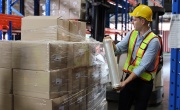Recycled EV battery materials outperform virgin mined ores
New research from Imperial College London suggests that recycled EV battery materials can deliver better performance compared to virgin mined materials, including longer battery life, fasting charging times, and lower costs.
 Research conducted by Imperial College London has found that recycled electric vehicle (EV) battery materials can match and exceed the performance of virgin mined materials, according to findings released by clean technology group Altilium.
Research conducted by Imperial College London has found that recycled electric vehicle (EV) battery materials can match and exceed the performance of virgin mined materials, according to findings released by clean technology group Altilium.
The study examined recycled cathode active materials (CAM) produced at Altilium’s ACT1 facility in Devon, comparing their performance to commercially available materials.
Amongst the benefits that the researchers found included longer battery life, faster charging times, and lower costs of manufacturing.
Technical advantages of recycled EV battery materials
The research identified several advantages of recycled materials over virgin ones. Unlike mined ores, which showed variation in quality and require extensive refinement, recycled materials from standardised, manufactured batteries demonstrated reduced impurities and more consistent metal composition. This would allow batteries to be more durable over time, even under repeated charging and discharging cycles.
The ability to adjust the recycled CAM also allowed researchers to customise the outcomes, including developing nickel-rich and cobalt-free formulations.
Analysis showed improvements in particle size and distribution, contributing to enhanced stability and cycling behaviour. The recycled CAM samples also maintained chemical and physical robustness during testing, indicating potential for sustained battery performance.
Additionally, the study found that recycled CAM precursors retained beneficial crystal structures and grain morphology, which could be used during re-synthesis to create high-performance materials.
According to Altilium, recycling reduces the cost and energy-intensive steps associated with mining, transporting and refining virgin ores, as well as costs associated with variable ore quality and supply disruptions. Lower energy use with recycling further drives down the carbon footprint of the process.
Dr Christian Marston, co-founder and COO at Altilium, commented: “Recycled CAM not only aligns with global sustainability goals but also offers improved technical performance at a lower cost, making it a game-changer for the EV industry.”
Researchers used electrochemical testing of coin cells and pouch cells made from recycled CAM, and compared the results to commercially available CAM used in high-nickel NMC 811 batteries.
The technology is currently undergoing further validation at the UK Battery Industrialisation Centre (UKBIC), where battery cells using the recycled CAM are being produced for testing.
In January, Altilium received a $5 million investment from Japanese trading and investment group, Marubeni, into its Teeside battery recycling plant, which is produced to process waste from 150,000 vehicles once operational.







